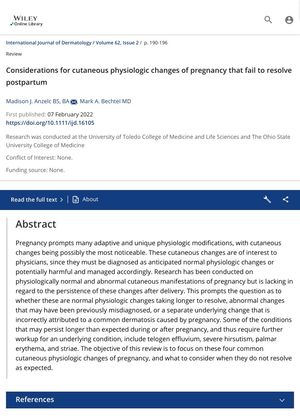Considerations for Cutaneous Physiologic Changes of Pregnancy That Fail to Resolve Postpartum
February 2022
in “
International Journal of Dermatology
”

TLDR Some skin changes from pregnancy like hair loss, excessive hair growth, palm redness, and stretch marks may not go away after birth and could suggest a misdiagnosis or hidden condition.
The review "Considerations for cutaneous physiologic changes of pregnancy that fail to resolve postpartum" discusses the skin changes that occur during pregnancy and the implications when these changes do not resolve as expected post-delivery. Pregnancy triggers many adaptive and unique physiological modifications, with skin changes being the most noticeable. These changes are important for physicians to diagnose as either normal physiological changes or potentially harmful ones that need management. However, there is a lack of research on the persistence of these changes after delivery. The review focuses on four common skin changes during pregnancy that may persist longer than expected: telogen effluvium (a form of temporary hair loss), severe hirsutism (excessive hair growth), palmar erythema (redness of the palms), and striae (stretch marks). The persistence of these conditions may indicate a misdiagnosis or an underlying condition that was incorrectly attributed to pregnancy.













